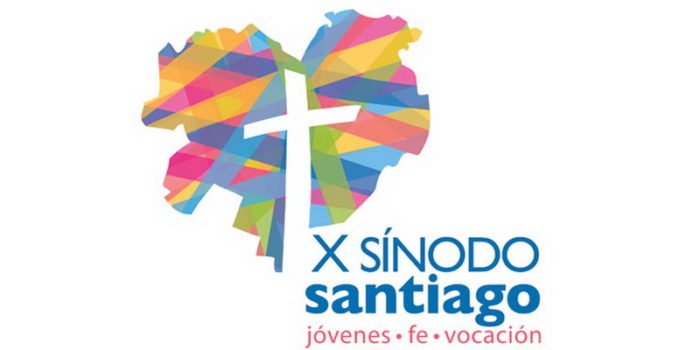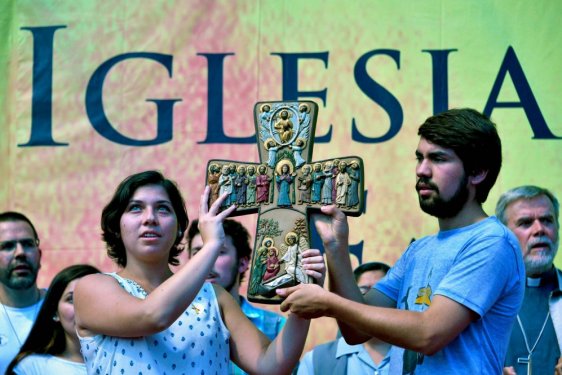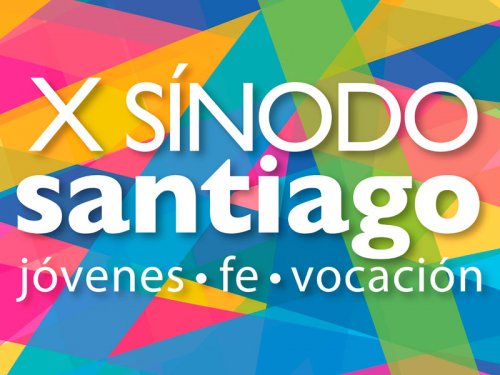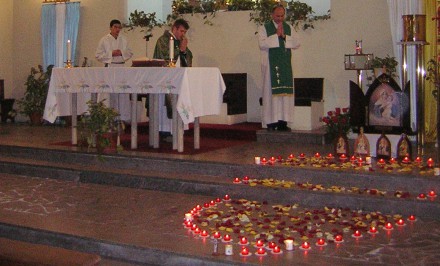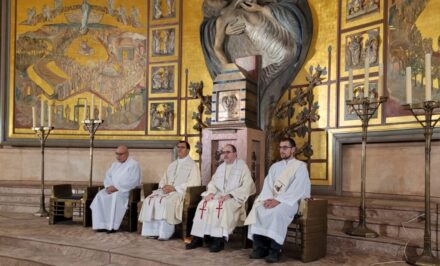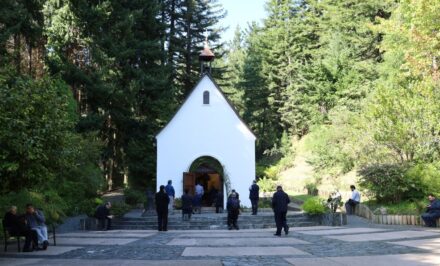CHILE, Interview of Pedro Ossandón Buljevic, Vicar of Southern Area of Santiago, by Verónica Gutiérrez, schoenstatt.org •
As a response to the Holy Father’s initiative, the 10th Synod of the Archdiocese of Santiago concerning “Young People, faith, and vocation” will be held on the 19, 20,21 May. During the gatherings, more than 100,000 people’s opinions will be compiled, and they will work on proposals about the Catholic Church with those youths that are believers and non-believers. Bishop Pedro Ossandón will participate in this process, and he comments about the stages and the surprising conclusions that have been compiled as of now.—
First of all, could you give us a definition of the synod and what are the steps that have been followed up to now?
The youth synod in Santiago is an initiative that is inspired on the synod that Pope Francis convoked about young people, the faith and vocational discernment, which will be held in Rome in October. The Synod is a congress that is defined as collegiality of pastoral discernment with the Pope. The Pope likes to consult with all the world’s dioceses about subjects particular to evangelization.
Cardinal Ezzati, Archbishop of Santiago, not only wanted for us to answer questions that the Bishops’ Synod of Rome sent, which are for each diocese, but he also wanted to have a local synod.
Is this being done in other areas of the country?
No. It is only being done in Santiago, because it was a decision of the bishop. The Cardinal decided to convoke an organism that is called an organizational commission to invite all Santiago’s churches, all men and women of goodwill that could work on the same subject: young people, the faith and vocational discernment. Consulting the laity, pastoral agents, the consecrated, and even non-believers, we could ask ourselves what young people were into, how do they define themselves, and how do they relate to the Faith, their life’s plans, and vocational discernment.
How did the synod begin?
The Cardinal convoked it at the beginning of January 2017. He formed an organizational commission of twenty-three people with representative character, where all the area’s vicariates and all the specialized vicariates are represented: family, educational, etc. The idea is that this commission will help for a year and a half, because the actual synod will be 19,20, and21 May. More than 40,000 people and Catholics who attend Mass were consulted, and they responded; 12,000 secondary and upper education students also participated. There are 210 parishes in Santiago, and practically all of them responded. Then an instrument was made that invited non-Catholic youths and youths of other religious beliefs that could also give their opinion about what young people are into—what their relationship to the Faith is or what their life is like.
What were the questions in this questionnaire?
One very concrete question was “Do you have faith? Yes or no. If you have faith, what are the concrete projects that you support: ecclesial community, missionary initiatives, spiritual accompaniment, retreats, family, etc.? If you do not have faith, what is happening to you in regards to the faith, what opinion do you have about faith and the Catholic Church? Tell us freely and if you have a criticism, please give it because we are interested. We want to listen to you attentively and (if you are right) we want to change.
What results were gathered?
The results have been very interesting. A document was published about this called “100 young people opine” and they are young people, who according to the Bicentennial Survey and INJUV (National Institute of the Youth) answered proportionally to the number of Catholics, Evangelicals, and other religious beliefs, non-believers, agnostics, from different social classes, communes, occupations and age groups—and for them to openly say what they think about the young people’s situation in relation to other subjects—about their relationship with the Faith and if their relationship with the Faith has to do with their life plan.
The Church of Santiago (and this seems the most important to me) has made an exercise of listening without a filter to what the youth freely say. On Saturday, 17 March, it was made known to everyone. After receiving the document, the propositional stages will follow.
When you speak about a life plan, what are you referring to?
All your basic decisions, your career decisions, you family life decisions, your human life decisions, your focus decisions about your plan, most charismatic, your own talents, are in harmony with a life plan. We believe that there is a very great need. Sometimes young people do not have anyone to talk to about deciding on their careers. They do not have anyone to talk to about how they are doing in their affective life in regard to their families, not only with whom to talk to but they also do not have an environment where they can form themselves or support one another. We need all the necessary tools for decisions that define your personal plan to be more solid, more mature, freer, and more authentic.
There are many youths who decide their life by what they heard on the television, from a popular song, from what a friend told them in passing, from an emotional breakup with the girlfriend; it is very superficial. Their lives are at stake.
With the results you have already seen, what kind of proposals do you think can emerge?
All these people who collaborated gave us much enlightenment. The Faculty of Social Sciences from the Catholic University deanery worked on the survey of 44,000. Many initiatives will come from the proposal of an ecclesial style— a style of being a Church that does not hinder its usual style in any way but learns to listen and to relate with cultures and styles and new people.
What opinions have you found?
There are some very surprising things. Youngsters who were believers and those that no longer are that have extremely serious misgivings against the Church, but that regarding the question that is so personal, and of confidence make positive proposals to resolve the issue. Another thing is an infinite multiplicity of expressions of faiths that is very difficult to classify. We encountered a more adult young man, very critical, who demanded more, who does not accept nor is convinced with the first answer, and who is considerably grown up. Sometimes he showed aggressive criticism, but one must understand him from a very holistic view, that he is older, and thus a person cannot give him just any answer —only an emotional or authoritarian as an argument— but instead, to tell him “you do not believe what I am saying, come let us continue to talk. You do not believe I live it, and you criticize me that I am inconsistent, well then, let us continue to get to know each other. You regret hitting hard, you want to come back to talk, good, let us talk again,” or I ask forgiveness because I judged him…
How do they confront the synod with all the bad publicity that the Church has gotten with all the cases of abuse or scams, etc.?
We wanted to address that. That is why, we not only consulted the previous instruments, in Mass and with sheets from different groups, but also, we wanted a face to face with complete freedom. We feel that Bishop Scicluna (the bishop designated from Rome to investigate sexual abuse cases in Santiago), came precisely to listen to those who are the most hurt or humiliated by their condition as victims. We thought that from the beginning, like Cardinal Ezzati and Pope Francis also thought, let the youths say what they want, and thus, everything appears: authoritarianism, sexual abuse of minors by the clergy, the Church’s lack of creditability, everything. That is extraordinarily positive.
Original: Spanish. 23 March 2018. Translation: Celina M. Garza, San Antonio, TX USA. Edited: Melissa Peña-Janknegt, Elgin, TX USA


